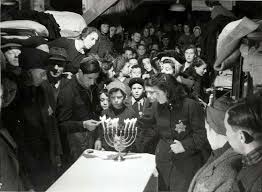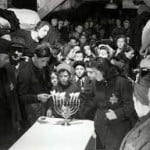The Torah portion of “Kedoshim” that is read this Shabbat in Israel declares the following ,seemingly impossible, declaration
“Speak to the entire congregation of the children of Israel, and say to them, You shall be holy, for I, Hashem, your G-d, am holy.”( Leviticus 19:2)
We continue to read of this concept several more times
”You shall sanctify yourselves and be holy, for I am Hashem, your G-d.” (Leviticus 20:7)
Then again;
“And you shall be holy to Me, for I, Hashem, am holy, and I have distinguished you from the peoples, to be Mine.” (Leviticus 20:26)
So how can we understand the concept of “Holiness” and why would the reality of Hashem being holy result in His people being holy as well?
The clear message in this week’s portion describes examples of how one is to live a designated and purposeful life . A life that at times involves separation and at other times consists of engagement. That is to say, a live lived within the will of a Holy G-d that transforms a people to become the language of that holiness. As the prophet Isaiah declares;
“He said to me, you are My servant, Yisrael – that through you I am glorified” (Yeshayahu 49:3).
Yet as we commemorate “Holocaust Remembrance day” this week in Israel, we must explore the other side of that instruction to be holy.
The Talmud describes Rabbi Akiva’s martyrdom. He is arrested for the crime of promoting and teaching Torah at every opportunity and venue. As he lay there ,before his execution, while his skin was raked off his body by Roman soldiers he decided to cry out the “Shema Yisrael” prayer (“Hear O Israel, Hashem is our G d, Hashem is one” Deuteronomy 6:4)
His students exclaimed, “Even now?”
Rabbi Akiva replied, “All my life I agonized over the verse, ‘…and you shall love G d…with all your life.’ It means, even if they should take your life from you. I pondered, ‘When will this come to me so I can fulfill it?'”(Talmud, Brachot 61b.)
Throughout the ages as Jews were being murdered, burned or tortured for their faith and they are seen as people dying for Kiddush Hashem (declaring G-d’s Name to be Holy). So many ended their lives with the Shema prayer on their lips. That was true in the torture chambers of the Christian Inquisition, under the murderous hands of the Caliphs, and in the gas chambers of Nazi Germany. Even those attacked and victimized for being Jews by terror or random anti-Semitism who did not declare this dramatic statement of faith were also seen as sanctifying G-d’s name. This is also true of even the many who did not choose to do so but were victimized nevertheless simply because of who they were.
The problem that needs to be confronted is understanding why such deaths constitute sanctifying G-d’s name. Why would their murders serve to make G-d be seen as more holy? It would seem the opposite would be true.
Furthermore the concept of martyrdom is foreign to Judaism. The concept of dying for one’ belief is not considered the highest virtue. Judaism is a theology and way of living that affirms and sanctifies life. The people of Israel are not focused on trying to get to heaven. Their ultimate purpose was trying to bring heaven down to Earth. To be Hashem’s language in our life and by so doing bring greater sanctity to His name.
‘He said to me, you are My servant, Yisrael – that through you I am glorified’ (Yeshayahu 49:3).
So what does the term “La-mut Al Kiddush Hashem” ( to die sanctifying G-d’s Name) truly mean. The confusion regarding this phrase arises out of distorted vision.
Those that are killed in Kiddush Hashem ( sanctifying His Name) do not achieve that sanctification by their deaths.
Their Kiddush Hashem is achieved rather by their frantic attempt to live a life representing Hashem even unto the very last second of that life. Those of our people killed because of who they were actually were killed because of Who they represented by their lives.
Rabbi Akiva did not yearn for death and in fact spent many years hiding in the underground teaching and living Torah. Yet at the last minutes of his life he wanted to keep living his Torah even with very his last breath.
There is a very heart-rending story (one of so many) told by Yaffa Eliach in her book “Hassidic Tales of the Holocaust “(1988)
In it she describes the account of one of the Jewish forced laborers describe the painful cries he heard one day. He discovered that that very day a selection had been made of babies that were to be sent to the ovens. In the midst of the tears he recounts hearing the desperate cry of one woman yelling to the laborers “Give me a knife.”
He described how he said to her, “Why are you hurrying so quickly to the world of truth…” at that point a German soldier screamed out, “Dog, what did you say to the woman?”
“She requested a pocketknife and I explained to her that it was prohibited to commit suicide.”
The woman glared at the German and discerned the bulge of a pocket knife in his coat pocket. “Give it to me,” she begged. The German gladly obliged. She bent down and picked up a package of old rags. Hidden among them, lay a newborn infant. In a flash he woman took the pocketknife, pronounced the blessing ― and circumcised the child. “Master of the Universe,” she cried, “You gave me a healthy child, I return him to You a worthy Jew.”
Living very moment to sanctify His name.
May the memory of all those holy souls be for a blessing.
LeRefuat Yehudit bat Golda Yocheved

